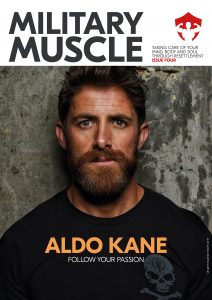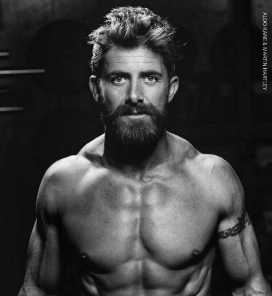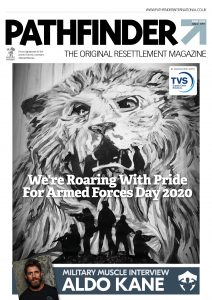Military Muscle was delighted to catch up with former Royal Marines Commando Sniper, Aldo Kane and he features in our exclusive interview in this month’s issue. Read it in its entirety below. Military Muscle is a health, fitness and well being supplement inside Pathfinder International magazine – the leading UK military resettlement magazine.

Finding Your Passion Can Lead To Successful Career Goals!
Military Muscle is delighted to catch up with extreme adventurer, rope specialist, climbing expert and mountaineer and well much, much more in Aldo Kane. A former Commando Sniper, now turning his hand to TV and film consultancy and behind the scenes technical production.
Here is Aldo’s story of military life, resettlement, ongoing transition, believing in your goals and following your passion…oh and abseiling into active volcanoes!
“I joined the Royal Marines at the age of sixteen, went down to Lympstone and got into recruit troop in September 1994, I did ten years in the Marines, between 40 Commando, Fleet Protection Group or Commachio Group as it was once called up in Faslane and down to 42 Commando.
When I passed out I went to 40 and I did Northern Ireland and all that type of stuff, then joined Recce Troop and over that next period of time I was in Recce Troop, Sniper and sort of kept that Sniper job role through to the end of my time in the corps.
I left at the end of 2003 and that was the end of Telic 1, so I obviously missed all of the Afghan tours. I had already done my resettlement by then and I was out and already working when that all kicked off, so it was kind of in the back of my head about re-joining and getting back in amongst it but because I had joined at the age of sixteen and got out at twenty six, I had this other question of what is the outside world like?
I’d never had a normal job, apart from paperboy to then being a Bootneck.”
I ask Aldo what was the main driver for joining up so early?
“My twin and I both joined actually, we were both set to join at the same time and then he stayed and finished his school and then joined when he was eighteen, but for me it was from an age of about twelve or thirteen I began to get vaguely interested in the military and began to read all of the commando magazines. Then I was on an Air Cadet camp in RAF Kinloss and I remember seeing a Bootneck helicopter pilot and I remember seeing his green lid, his green beret and he stuck it down on the NAAFI counter in front of me and I must have been only fourteen and I had a chat with him and he told me about the corps and about the Marines and that was it. From fourteen onwards, I was like, that’s what I am going to do. As soon as I could sign the paperwork, I did, it was just like a childhood dream to do it and then at sixteen I am going through Commando training at Lympstone.”
Was that daunting for such a young lad?
“I was actually quite beside myself with excitement. I remember lying awake on Woodbury Common on the very first exercise you were doing and you could hear several other recruit troops coming under contact and firing weapons and I just thought this was one of the most exciting things that I could possibly be doing with my life at that time and that was the first night that I had spent out.
I never found any of it daunting as I had no other frame of reference, it’s not like I was joining at twenty-one where I had been grafting somewhere else and had previous knowledge of what normal life was like. I think having no frame of reference helped, it just meant you dealt with what you were given on a daily basis and you don’t compare it to what you used to have, but it was amazing and I loved it.”
And what the main driver for leaving the military?
“I always think the best thing I ever did was joining the Marines and I think the second-best thing I did was leave at that time where I didn’t want to leave. I’d left at a time where I felt I was at the top of my game, I was doing incredibly well and it was difficult for me to leave, but somewhere deep down inside of me I had this drive to do something else and it was starting to take shape in the early days in the Marines when it was about adventure and about being on expeditions and climbing, I had just started to learn to climb, to ski, to mountaineer and I suppose I was thinking in my head, I was twenty-six, if I don’t like the outside world, I can join back up and see off the rest of my career there in a kind of selfish way. That is what drove me to get out and the reality of getting out was that it was one of the hardest times of my life.

Ten years in the military and in my mid-twenties having just come back from Iraq involved in fighting to then go and into the civvy world and learn everything about civilian jobs and how that worked and not having the back up of the corps behind you, it was incredibly lonely and difficult period of time.
The only thing driving me through it was the fact that I knew it wasn’t going to last forever, it would be a transitional phase and that was what I was going through and vowed not to make any decisions in that first year because I was still finding my feet and actually as I say this was the second best thing I ever did as after ten years in the military, I had all of these skills, qualification and experiences behind me, but I was still young and still hungry for something else.”
And so, what was behind the decision to leave?
“Weirdly, it was difficult because I didn’t want to leave the thing, I was part of, the brotherhood, but I just had this other drive to get on, to keep pushing in a different direction.
I left at a time when people were doing sort of computer stuff and most people were like, “I am going to get out and do computer engineering” but I didn’t want to go down the route of another uniformed service which was the actual easiest option for me. So I did the rope access and offshore stuff and so I did the full resettlement package and that got me qualified on (as I was already climbing) rope access and non-destructive testing and so basically I was an offshore inspection engineer.
So I did that for my resettlement when I left but when I got out I went into working for an organisation called Skillforce so I did a couple of years with them whilst I was finding my feet which is the best transition actually because I came from the military, I then came into this organisation which was teaching kids in school in my local area, but I was working with ex-military instructors. I was working with an ex-Argyle and Sutherland Highlanders’ RSM and a couple of his Warrant Officers, so I went straight into this civilian military which was a brilliant two years of sliding into civvy street really.

I still had my sights fixed on going off shore as it was better money and more than the money it was about the time off and you would get two on, two off at the time and it also offered the same opportunity of travel as the corps did. There were all sorts of jobs kicking off in the middle east and far east and it was like being back at the time when I was just joining the corps and there were all of these options and it felt the same when I did the rope access.
So, I did two years at Skillforce whilst I was finding my feet and then I got my first job away. Its not that easy to get a job offshore either, it can take a bit of time and getting people to trust you, to get a reputation because A it’s a good job and B the roles are well sought after and so it took me almost two years to get the job offshore.
I got my first inspection job and I did that for three years on the oil rigs and when I was coming back from being offshore I was in the process of how I could set up my own business and I messed around doing a few different ideas. I did a bit of property development which didn’t really work out, I did chewing gum removal, I bought a big pressure washing machine removing gum from streets in my leave from offshore, I mean it was just ways of trying to generate extra money really.
That didn’t really work out and then I brought everything back home and using the ethos “there’s acres of diamonds in your back yard” I basically just realised I’d already been doing Rope Access offshore, why didn’t I just set up a business doing that on the beach. And that’s what I did, I set up a company that serviced wind turbines, did blade repairs and did quite a lot of civil work on the dams, hydroelectric, so really I spent the next three or four years doing a lot of that work, even sometimes just cleaning buildings, window cleaning, anything on the ropes.
That was the first look at my life and job wise I’d had the Marines, then Rope Access of offshore, oil rigs, wind turbines and then the next phase is the TV phase and I guess I am kind of in that one now.”
Its only now I hear Aldo’s career story, you realise it isn’t a walk in the park and straight into TV work as some of us would think, with Aldo explaining more…
“When you see things from the outside, it’s easy to assume they got there very easily and quickly, and I reckon from my own experience that the resettlement phase probably took around five years. I had bounced three or four jobs and I was in a job career line that I thought this is going in the right direction and I was happy, I was earning money, I didn’t have mega problems at home, but I reckon that took five years still.
The TV side of things is a mega slow burn. I get emails all the time saying “I’ve just done this” and “I’ve just got this qualification, I’d like to do the job you do” but when it comes on TV, the films we’ve worked on TV, that’s from like two years ago and it might have been the only job we did at that point.
On the outside it is the perfect job but its taken twelve years and in the first four years, I was probably doing one job a year and I was still doing my wind turbine stuff, rope access and cleaning pigeon crap off bridges at this point, I was still in between jobs going out and doing my day job and I’ll always keep my tickets because this type of work (TV work) won’t last forever so I’ll always keep that in the back pocket and perhaps go back to that at some point.”

Tell me a little about the first TV job, that was interesting…
“My friend asked me if I could get a film crew inside an active volcano in the Congo and that to me was like, everything that I had been doing up to that point, I’d been making it work and the minute I found out I could go somewhere, have an adventure, get paid for it and then its on TV to get a second run of reliving it and it was just a mega turning point and that was 2010.
I came back from that job, sat in my kitchen, and drew out a plan of where I wanted to be in five years, ten years from now.
I have done so many of these jobs now where you think, “how the hell did I get here?”, things like doing all the safety and security work for Foxy’s (Jason Fox) Narcos series a couple of years ago and I have been Steve Backshall’s right hand man working with the expedition crew on twelve world first expeditions and then we’ve done a couple of undercover tiger documentaries around anti-poaching and conservation, but really my business now is providing technical safety services to the TV and film industry, from rigging on The Avengers to setting up ropes or diving sites for TV production, so the majority of my work even now is off camera, is doing what I joined the Marines for. Doing eighteen hour day’s hard graft with not a lot of recognition, but you get that sense of self, sense of purpose and worth, you just generally feel like you are contributing to something much bigger than yourself and I think that is what I really like about it.
The stuff I have been doing on screen has only been in the last four years and that was really because I’d been asked so many times to do on screen stuff and I hate any attention and so I said I’ll give it one shot and you really have to be hungry for it. It’s a case of ultimately whatever you set your mind to, you will get there in the end.
And now I have Vertical Planet as my company. The work is varied, sat having lunch with the Narcos hitmen in Colombia and then I can be discovering a waterfall in Suriname for the first time that’s never been mapped or charted and then I can be sat in a bush crapping in a bag back on OP routine while I am investigating a tiger farm in south east Asia.
If you asked me when I was sixteen what job I’d like to be doing when I was forty, I would have described this job. I maybe wouldn’t have had the details about it in depth, but this is exactly where I want to be, this is what I want to be doing.
This only happened to me once I took my life into my own reigns. In the first five years after leaving the military, I was part of the crowd and following routine and expect that things would happen for me. When you realise that that isn’t the case, if you don’t have a plan you will be come part of someone else’s plan and when that clicked, that’s when things started to take off.
I found my passion and then I gave it everything I had.”
Aldo Kane was talking to Mal Robinson.
Check out Aldo’s work at: http://www.verticalplanet.tv/
Check Aldo’s official website with workout programmes at https://aldokane.com/
Read the entire issue of Pathfinder & Military Muscle here for free

